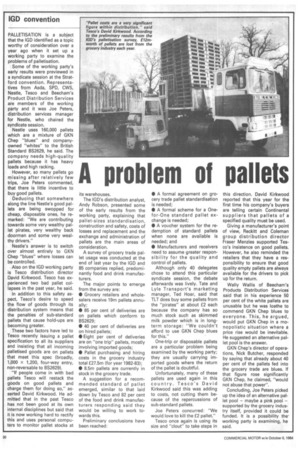A problem of pallets
Page 34

If you've noticed an error in this article please click here to report it so we can fix it.
PALLETISATION is a subject that the IGD identified as a topic worthy of consideration over a year ago when it set up a working party to examine the problems of palletisation.
Some of the working party's early results were previewed in a syndicate session at the Stratford convention. Representatives from Asda, SPD, CWS, Nestle, Tesco and Beecham's Product Distribution Services are members of the working party and it was Joe Peters, distribution services manager for Nestle, who chaired the syndicate session.
Nestle uses 160,000 pallets which are a mixture of GKN Chep "blues" and companyowned "whites" to the British Standard BS2629, he said. The company needs high-quality pallets because it has heavy loads and high racking.
However, so many pallets go missing after relatively few trips, Joe Peters commented, that there is little incentive to buy good pallets.
Deducing that somewhere along the line Nestle's good pallets are being swopped for cheap, disposable ones, he remarked: "We are contributing towards some very wealthy pallet pirates, very wealthy back doormen and some very wealthy drivers."
Nestle's answer is to switch over almost entirely to GKN Chep "blues" where losses can be controlled.
Also on the IGD working party is Tesco distribution director David Kirkwood. Tesco has experienced two bad pallet collapses in the past year, he said.
In addition to this safety aspect, Tesco's desire to speed the flow of goods through its distribution system means that the penalties of sub-standard pallets that cause hold-ups are becoming greater.
These two factors have led to Tesco recently issuing a pallet specification to all its suppliers and insisting that all incoming palletised goods are on pallets that meet this spec (broadly, 1,000 x 1,200, four-way entry, non-reversable to BS2629).
"If people come in with bad pallets Tesco will restack the goods on good pallets and charge them for doing so," asserted David Kirkwood. He admitted that in the past Tesco has not been good at its own internal disciplines but said that it is now working hard to rectify this and uses personal computers to monitor pallet stocks at its warehouses.
The IGD's distribution analyst, Andy Robson, presented some of the early results from the working party, explaining that pallet-sizes standardisation, construction and safety, costs of losses and replacement and the exchange and administration of pallets are the main areas of consideration.
A survey of grocery trade pallet usage was conducted at the end of last year by the IGD and 85 companies replied, predominantly food and drink manufacturers.
The major points to emerge from the survey are: • Grocery retailers and wholesalers receive 19m pallets annually; • 85 per cent of deliveries are on pallets which conform to BS2629; • 40 per cent of deliveries are on hired pallets; • Eight per cent of deliveries are on "one trip" pallets, mostly involving imported goods; • Pallet purchasing and hiring costs in the grocery industry total £27.5m (for year 1982-83); • 8.5m pallets are currently in stock in the grocery trade.
A suggestion for a recommended standard of pallet emerged, similar to that laid down by Tesco and 82 per cent of the food and drink manufacturers responding said they would be willing to work towards this.
Preliminary conclusions have been reached: • A formal agreement on grocery trade pallet standardisation is needed; • A formal scheme for a Onefor-One standard pallet exchange is needed; • A voucher system for the redemption of standard pallets when none are available is needed; and • Manufacturers and receivers need to assume greater responsibility for the quality and control of pallets.
Although only 40 delegates chose to attend this particular syndicate session, the debate afterwards was lively. Tate and Lyle Transport's marketing manager, Ted Hoar, said that TLT does buy some pallets from the "pirates" at about £2 each because the company has so much stock such as skimmed milk powder which is in longterm storage: "We couldn't afford to use GKN Chep blues for this."
One-trip or disposable pallets are a particular problem being examined by the working party; they are usually carrying imported goods where the return of the pallet is doubtful.
Unfortunately, many of these pallets are used again in this country. Tesco's David Kirkwood said this was adding to costs, not cutting them because of the repercussions of sub-standard pallets.
Joe Peters concurred: "We would love to kill the £2 pallet."
Tesco once again is using its size and "clout" to take steps in this direction. David Kirkwood reported that this year for the first time his company's buyers are telling certain Continental suppliers that pallets of a specified quality must be used.
Giving a manufacturer's point of view, Reckitt and Coleman group distribution director Fraser Menzies supported Tesco's insistence on good pallets. However, he also reminded the retailers that they have a responsibility to ensure that good quality empty pallets are always available for the drivers to pick up for the return.
Wally Wallis of Beecham's Products Distribution Services said that in his experience 50 per cent of the white pallets are unusable but he was loathe to commend GKN Chep blues to everyone. This, he argued, would put GKN Chep in a monopolistic situation where a price rise would be inevitable. He suggested an alternative pallet pool is the answer.
GKN Chep's director of operations, Nick Butcher, responded by saying that already about 40 per cent of the pallets fed into the grocery trade are blues. If that figure rose significantly GKN Chep, he claimed, "would not abuse that power".
Concluding, Joe Peters picked up the idea of an alternative pallet pool — maybe a pink pool — supported by the grocery industry itself, provided it could be funded. It is a possibility the working party is examining, he said.




























































































































































